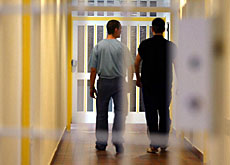Experts divided over youth crime “epidemic”

The fatal stabbings of two teenagers in gang attacks have generated alarm in the Swiss press amid fears of an upsurge in youth violence and crime.
But experts are split over whether juvenile crime is really on the increase across Switzerland.
Criminologist Eva Wyss, who specialises in crime research for the Swiss National Science Foundation, insists such fears are unfounded.
“Statistics proving that juvenile crime is really increasing simply don’t exist,” Wyss told swissinfo.
“All we have are figures for numbers of crimes reported to the police,” she continued.
“Also our sensitivity to violence has increased and our behaviour in terms of what we report has changed, so these figures are not very informative – they tell us about the work of the police but nothing more.”
Statistics disputed
But the implication that people are simply reporting more crimes – rather than crime actually increasing – is hotly disputed by Martin Killias, a specialist in crime research at the University of Lausanne.
Killias points to studies from Sweden, the Netherlands, Britain and Switzerland which appear to indicate that the number of convictions among juveniles is increasing dramatically.
“I would guess that the numbers of convicted juvenile offenders is ten to 20 times as high as in the 1950s,” Killias told swissinfo. “This is a tremendous increase.”
But Killias concedes that statistics are not always as reliable as they first appear.
“Everybody knows conviction figures are not that reliable,” he admits. “But if you have a sustained trend over 40 years, it’s crazy to say it’s somehow a statistical blip.”
Gang violence
Statistics aside, those working with young people are simply concerned by the random nature of some of the attacks being reported.
Jürg Haeberli, head of youth affairs at Bern’s social work department, has had to contend with a series of violent incidents this month along the river Aare.
In one instance, a gang of youths assaulted a group of students picnicking in a city park, leaving at least one of them so badly injured that he required hospital treatment.
Last month a 40-year-old man was left for dead after being beaten unconscious in a city centre gang attack.
Getting their kicks
Haeberli believes that while such attacks are extremely rare, there may be a small section of young people for whom violence has become something of a sport.
“The threshold for violence seems to have become lower for a small fraction of young people,” Haeberli told swissinfo. “And there seem to be violent attacks just for the sake of it.”
But Haeberli is also concerned by the intense media coverage of the river attacks.
Many newspaper articles have given the impression that Switzerland has turned overnight from a crime-free paradise into a country where it’s dangerous to walk the streets.
“The whole thing has been completely exaggerated,” he said. “Switzerland remains a very safe country. Of course it’s still safe to go out at night.”
Youth aggression
Meanwhile psychologist Allan Guggenbühl, who specialises in youth aggression and conflict resolution, says the suggestion that gang violence is a new phenomenon in Switzerland is completely wrong.
“There were violent gangs 100 years ago in Zurich,” Guggenbühl told swissinfo. “There were violent brawls in the bars and restaurants every Friday and Saturday night.”
Guggenbühl believes the current bout of national hand-wringing is more to do with a shift in values.
“We live in an increasingly geriatric society,” he explained. “There are many more old people, and this changes the values of our society. We are much more focused on safety and doing things by the rules.”
“What this means is that youthful aggression, or the tendency to settle a dispute physically, has become completely taboo – it’s considered pathological.”
swissinfo, Imogen Foulkes
A spate of violent incidents involving young people in Switzerland has led to fears of an epidemic of juvenile violence.
Swiss crime experts can’t agree as to whether crime among young people really is rising or not.
Some believe that people are simply more prone to report things to the police than they used to be, others say crime is much easier to commit, and therefore more common.
Some youth and social workers believe that a small proportion of young people may be more prone to commit acts of violence than in earlier times.
This appears to be supported by statistics which show that only 0.25 per cent of all young people in Switzerland have any contact with the police because of acts of violence – one in 400 young people.

In compliance with the JTI standards
More: SWI swissinfo.ch certified by the Journalism Trust Initiative











You can find an overview of ongoing debates with our journalists here . Please join us!
If you want to start a conversation about a topic raised in this article or want to report factual errors, email us at english@swissinfo.ch.